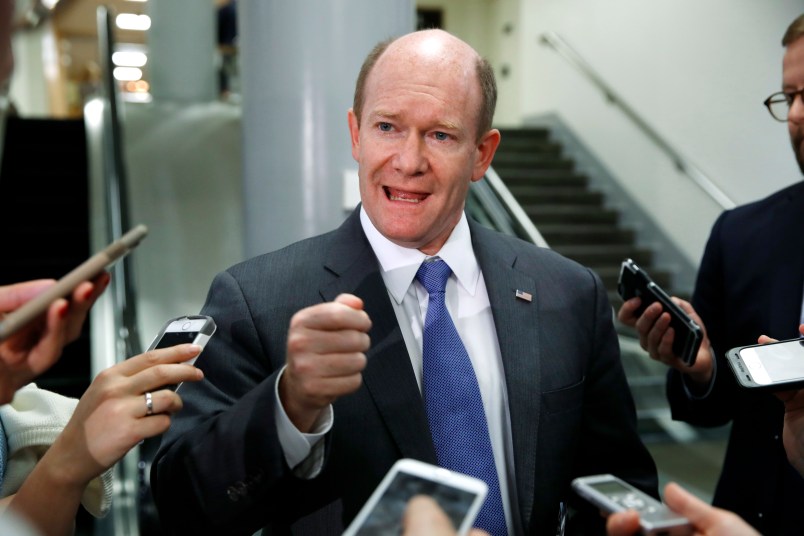When the Justice Department announced Wednesday evening that it was appointing former FBI Director Robert Mueller as a special counsel investigating Russian interference in the 2016 election and possible collusion with the Trump campaign, both Republicans and Democrats cheered the news.
But less than 24 hours later, after a classified briefing from the man who appointed Mueller—Deputy Attorney General Rod Rosenstein—many senators were angry, frustrated, and fearful that both they and the American public will remain in the dark as the federal investigation unfolds.
Lawmakers said Rosenstein refused to answer many of their questions Thursday about the successive scandals that have hit Washington over the last few weeks—including why Trump abruptly fired FBI Director Jim Comey, what exactly Rosenstein’s role in that drama was, and whether the congressional committees investigating Trump and Russia will be able to subpoena documents and interview witnesses going forward—because Mueller has not yet set the parameters of his probe.
“Maybe somebody else found something useful in that, but I didn’t,” Sen. Jeff Merkley (D-OR) huffed as he emerged from the briefing with Rosenstein. “Basically every answer he gave was, ‘I can’t comment because it may be the subject of an investigation by Mueller.”
“It was a very sobering briefing,” Sen. Chris Murphy (D-CT) added. “As it became clear how little he was willing to talk about it, it also became clear how broad this investigation Mueller is about to undertake actually is.”
Several lawmakers confirmed to TPM that the FBI’s investigation is now both a criminal and a counterintelligence matter that could include Comey’s firing, Rosenstein’s memo that was used as the basis for that firing, the various scandals of Michael Flynn, and a host of other areas.
Sen. Chris Coons (D-DE) was among those warning that Mueller has no obligation to report anything about his work—even the scope of the inquiry—to Congress or the public, unless it leads to an indictment. “We may not know for months or years,” he told reporters.
Coons and other lawmakers said the appointment of a special counsel may limit the ability of the House and Senate Intelligence, Judiciary and Oversight committees from conducting their own investigations into the Trump-Russia mess.
“I didn’t hear anything that gives assurance that they will have the access they need,” Merkley said.
Some Republicans, including Sen. Ron Johnson (R-WI) appeared to gloat that the same Democrats who had spent weeks demanding a special counsel are now worried about the implications for transparency.
“It probably frustrated my Democratic colleagues, but they got what they asked for,” Johnson quipped with a smile.
“I think a lot of members wanted the special counsel to be appointed but don’t understand that you’re pretty well knocked out of the game,” added Sen. Lindsey Graham (R-SC), who sits on the Judiciary Committee. “And that’s the way it should be.”
Several members of Congress on both sides of the aisle disagreed, and vowed to continue to pursue rigorous committee investigations no matter the scope of the FBI’s inquiry.
“The public deserves a strong and public oversight by the Congress on how Russia has tried to influence our country,” Judiciary Committee member Sen. Patrick Leahy (D-VT) told TPM. “We should go ahead with that. That in no way detracts from what Robert Mueller will do. As good as his appointment was, it does not mean the Congress will say, ‘Our job is done.'”







Maybe if the GOP Senators and Representatives had not slow walked every step of their investigations a special counselor might not have been needed. I think Merkeley should have raised that issue.
The Democrats’ best ally in all of this is… wait for it… Donald Trump. If he were smart enough to keep his mouth shut, and keep his fingers off the Twitter, a lot of this would be moved off the front burner, as the investigation gradually grinds on in the background. But no, that’s not what’s going to happen. Every tidbit that leaks out will provoke more self-incriminating statements from Trump, and more juvenile temper tantrums.
Because the Senate serves our interests so well…
Between a renewed media investigating and angry Trump tweeting there will be plenty of transparency…but, you’re Senators and fancy lawyers so I’m sure you’all can think of something to get some camera time.
It will all be transparent to the Russians.